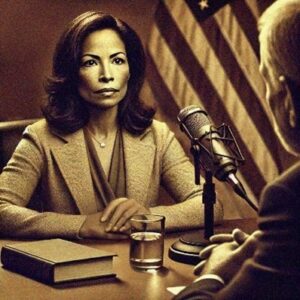 Navigating Political Questions in Author Interviews: Your Media Guide
Navigating Political Questions in Author Interviews: Your Media Guide
You’ve been looking forward to this media interview all week. You’re excited to talk to one of your favorite podcasters about your book—its world-building, its unforgettable characters, maybe even your best writing advice. But then, just a few questions in, the conversation takes an unexpected turn—straight into politics. This is why navigating political questions in author interviews can be so challenging nowadays.
This phenomenon is happening a lot lately. Even if your book isn’t political, a host may still connect its themes to a current debate, putting you in an uncomfortable position. How you respond in the moment can shape the direction of the conversation—and even your public perception as an author.
Your author brand is important. My advice? Don’t let them define you.
When a Host Goes Rogue
Today’s political climate has pushed polarizing debates to the forefront, sometimes catching guests off guard. Even media personalities who have never discussed politics before may suddenly bring it up, intentionally or not. While most bookish podcasts, radio shows, and literary interviews remain focused on storytelling, we’re seeing more hosts veer into unexpected territory.
The good news? You don’t have to get pulled into a debate you didn’t sign up for. Here’s how to handle navigating political questions in author interviews with confidence.
1. Decide Your Stance
Before your interview, consider where you stand on controversial topics. Are you comfortable engaging? If so, your talking points should reflect that, and you should be prepared to discuss your perspective clearly and thoughtfully.
However, if you’d rather steer clear, that’s okay too. Not every author wants their book to become part of a larger debate. Knowing your boundaries ahead of time will help you navigate tricky questions with ease.
2. Practice Your Response
Even if you don’t plan to engage in political discussions, you should still be prepared for them. Work through possible scenarios and practice responses that feel authentic to you. Keep them concise, professional, and free of emotional or defensive reactions.
One of the very first steps we take at Black Château when preparing an author for interviews is to create a list of talking points. This serves as a guide for both the author and the interviewer, helping to keep the conversation focused. While it won’t prevent a host from going off-script, it can set clear expectations from the start.
A Few Response Methods for Unwanted Political Questions:
A direct but neutral statement: “I appreciate that perspective, but my book focuses more on [topic].”
A simple deflection: “That’s an interesting question, but what I really love talking about is [insert book-related topic].”
A polite refusal: “I prefer to keep the conversation focused on my work, but I appreciate the question.”
3. Master the Art of the Pivot
If you find yourself in an uncomfortable discussion, pivoting is your best tool. A skilled pivot acknowledges the question but redirects the conversation back to your book, expertise, or a more comfortable topic.
For example:
Interviewer: “Your book touches on themes of justice—do you think the current political climate reflects that?”
You: “That’s an interesting thought. My book explores justice through a historical lens, and one of the things I found fascinating while researching was how different societies have interpreted it over time . . .”
The key is to acknowledge the question without getting pulled into a debate. This keeps the conversation productive and within your comfort zone.
4. You Set the Pace
Not every difficult question is asked with bad intentions—sometimes, a host might fire off a question abruptly, or the conversation might take an unexpected turn. One of the best ways to retain control of the dialogue is by slowing down and responding thoughtfully.
A brief pause before answering can work to your advantage. It prevents a knee-jerk reaction, gives you a moment to gather your thoughts, and can help alleviate any tension that may be building. A great way to do this is by acknowledging the question with a neutral and complimentary response before pivoting to your main point.
For example:
“That’s a really thought-provoking question. I think a lot of people are considering these issues right now. For me, I approached this theme in my book by . . .”
“You bring up an interesting perspective. When I was writing, I really focused on . . .”
Notice how much time you give yourself to think with these responses? Instead of rushing to say something off the cuff, stay calm and focused. This technique not only gives you time to think, but it also keeps the conversation feeling positive and professional.
Final Thoughts
Remember, interviews should serve your book—not pull you into discussions you’re not prepared for. By deciding your stance ahead of time, practicing your responses, and learning how to pivot gracefully, you can keep the focus where it belongs—on your work—when navigating political questions in author interviews.
This article originally appeared here.

Desireé Duffy, Founder, Black Château, Books That Make You, and The BookFest
